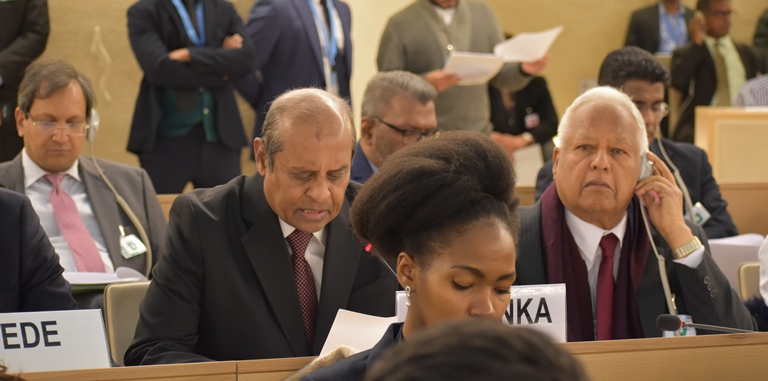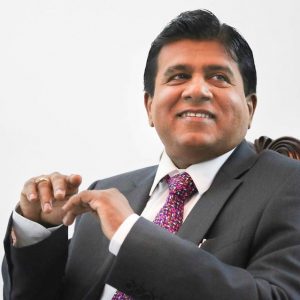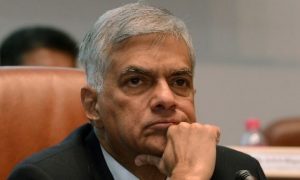Colombo, March 23 (newsin.asia): The Ilankai Tamil Arasu Katchi (ITAK) Member of Parliament M.A. Sumanthiran’s constitutional justification for seeking foreign judges to serve in the proposed Judicial Mechanism to try alleged war crime cases, has put the government in a spot, and his Tamil rivals in the shade.
In a statement in parliament on Friday, Sumanthiran said that there is no constitutional bar to the appointment foreign judges to Lankan counts.
He was responding to the statement of the Sri Lankan government in the UN Human Rights Council (UNHRC) on March 21 that the Lankan constitution does not allow foreign judges and lawyers to function in Lankan courts, and if they were to be allowed, the constitution has to be amended with a two third majority and a referendum to boot.
“Art. 105 of our constitution lays no restriction, and Art. 111, with regard to the High Court, lays no restriction with regard to the nationality of judges. It is false to say that the Constitution prohibits the participation of foreign judges. It does not prohibit. There are judicial decisions in this regard.”
“Unlike in the case of the Indian and Pakistani constitutions, the Lankan constitution does not contain any guidelines qualifying or restricting or circumscribing the act of appointment of judges, ” he said.
Referring to former Justice Minister Wijeyadasa Rajapakshe’s objections to foreign judges, Sumanthiran recalled that Rajapakshe and he were in Geneva when the issue of foreign judges was discussed. Rajapakshe had agreed that there was no bar for the appointment of foreign judges to a Sri Lankan court. “It was upon Rajapakshe’s agreement that the UNHRC resolution 30/1 was signed by the government of Sri Lanka, ” Sumanthiran said.
He recalled that it was Wijeyadasa Rajapakshe, who, in 2013, presented to parliament a private member’s bill which provided for foreign judges. “If Wijeyadasa Rajapakshe thought that it was unconstitutional, he could not have done that,” the Tamil MP pointed out.

Furthermore, if there was no scope for foreign judges joining the Judicial Mechanism, why did the Lankan government co-sponsor resolution 30/1 of 2015 and subsequently two more times, when the said resolutions always contained a clause relating to foreign judges, Sumanthiran asked.
Will Go For Foreign Adjudication
He then went on to warn that if the government were to stick to the position that there is no room for foreign judges, the Tamils will have no option but to ask the international community to take the cases to the International Criminal Court (ICC).
Asked how this could be done without Sri Lanka’s signing the Rome Statute which is the ICC Statute, Sumanthiran said that it would get the UN Security Council (UNSC) to order an international court. If this move is vetoed in the UNSC by Russia or China, other avenues of forming an international tribunal could be explored, he said.
“I want to make one thing very clear. The government of Sri Lanka has made these commitments three times in writing. But if they do not adhere to this commitment of including independent foreign judges in the judicial mechanism, then we the Tamil people will be left with no alternative but to move towards an entirely international judicial mechanism. That is possible and our people have been asking for this, asking that Sri Lanka be referred to the International Criminal Court (ICC).”
“We prefer a hybrid judicial mechanism, but if the government, despite all of these written commitments, and the fact that it is possible under the constitution to do so, doesn’t do it, then I today announce to the government and to the country, that we will take steps to move Sri Lanka to the ICC or some other entirely international judicial mechanism.”
 “So if the words of the Foreign Minister in Geneva are to be realized, that we must find mechanisms for reconciliation within the country, then you must adhere to these commitments. It is only through the participation of foreign judges can independence be assured.”
“So if the words of the Foreign Minister in Geneva are to be realized, that we must find mechanisms for reconciliation within the country, then you must adhere to these commitments. It is only through the participation of foreign judges can independence be assured.”
“In a matter where the contesting parties or the warring parties include on one side the state of Sri Lanka and on the other side a militant group that had the objective of dividing the country, the state of Sri Lanka cannot be an independent arbiter and it is because of an independent judicial mechanism that nobody can complain about, that we have asked for participation of foreign judges.”
“If that is not adhered to, and the commitments given to the International community are breached, then the country will have to face a tribunal that is entirely international,” Sumanthiran warned.
Embarrassment to UNP Government
The UNP government will be very embarrassed and inconvenienced by Sumanthiran’s contentions as both Foreign Minister Tilak Marapana and Prime Minister Ranil Wickremesinghe have publicly stated that there is no legal room for foreign judges. They cannot now put that argument before the UNHRC headed by the Western world.
The government many have to find ways of involving foreign judges without damaging its own case on war crimes which is that no war crimes were committed.
Alternatively, government can take shelter under the provision in the resolution that the UN should take steps only with the concurrence of the Sri Lankan government. Thus, Sri Lanka need not give its concurrence to any proposal for appointing foreign judges.

Impact On Tamil Politics
Sumanthiran’s speech could have an impact on the electoral choice of the Tamils living in the Northern and Eastern Provinces. Presidential, parliamentary and provincial elections are due from the second of 2019 and the first half of 2020.
All Tamil political parties in the former war-zone in Sri Lanka’s North and East have been demanding foreign judges, prosecutors and defense counsels. And they have all based the demand on the apprehension that the Sri Lankan judiciary will be biased in favor of the Sri Lankan armed forces on communal grounds. All parties also draw upon the UNHRC’s resolution of 2015 which recommends the appointment of foreign judges.
But it is only Sumanthiran of ITAK who has justified the demand on the basis of the constitution and law of Sri Lanka making it difficult for the government to escape.
Sumanthrian’s presentation could turn out to be a powerful propaganda tool in the hands of the ITAK when elections to the provincial councils and parliament are announced between now and mid 2020.
It will knock the bottom out of the rivals’ argument that the ITAK has lost the will to fight for the Tamils and has become a handmaiden of the ruling United National Party (UNP).




























































